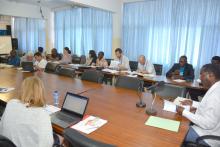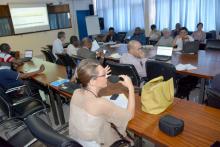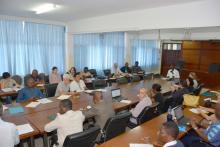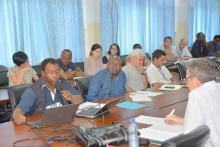The Minister of Public Health on mission to Likati with WHO and UNICEF
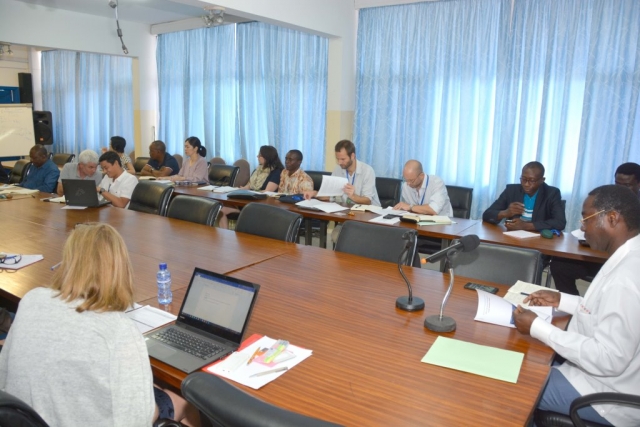 Kinshasa/Likati | 18 May 2017 – The Minister of Public Health, Dr Oly Ilunga Kalenga, travelled on 17 May 2017 to the Likati health area in Aketi, Bas-Uélé Province, located more than 1300 kilometres from Kinshasa, in the Nord of DRC, to coordinate the response provided following the confirmation of the occurrence of the Ebola virus disease.
Kinshasa/Likati | 18 May 2017 – The Minister of Public Health, Dr Oly Ilunga Kalenga, travelled on 17 May 2017 to the Likati health area in Aketi, Bas-Uélé Province, located more than 1300 kilometres from Kinshasa, in the Nord of DRC, to coordinate the response provided following the confirmation of the occurrence of the Ebola virus disease.
The Ebola virus disease epidemic was officially reported by the Minister of Public Health of the Democratic Republic of the Congo (DRC) on 11 May 2017 following confirmation by the National Biomedical Research Institute (INRB) of the result of the analysis of blood samples taken from suspected cases. To date, the update on the epidemiological situation indicates a cumulative total of 29 suspected cases, 3 deaths and 2 confirmed cases.
“ The DRC Government has adopted a response plan estimated at US$ 14 million. A crisis management team, led by the Minister of Public Health, has been set up to coordinate the response. It is working in close collaboration with its technical partners, including WHO and UNICEF”, the Minister of Public Health, Dr Oly Ilunga Kalenga, said during his field visit. Dr Allarangar Yokouidé, the WHO Representative, and Dr Tajudeen Oyewale, the UNICEF ad interim Representative, accompanied the Minister of Public during this visit.
“We place this first field visit under the banner of solidarity and compassion with the populations of Likati affected by this eighth episode of the Ebola virus disease in DRC. We are appealing for more solidarity from the international community to help DRC to urgently contain this epidemic”, Dr Allarangar Yokouidé, the WHO Representative in DRC, said.
The response is organized through seven technical committees in charge respectively of surveillance and investigations, medical coverage, laboratory and research, risk communication, social mobilization and community engagement, water, hygiene, sanitation and biosafety, psychosocial management as well as logistics.
Access to the Likati health area is difficult, and one of the major challenges is to open up this area affected by the epidemic. The Government teams have been deployed on the ground and have started taking samples from all suspected cases. The teams are carrying out active case finding in the health centres and within the community and are organizing the follow- up of contacts with community workers. The various community leaders are sensitizing their communities on the prevention of the disease.
“ UNICEF lauds Government leadership in the response to the Ebola virus epidemic and is committed to working with it. Our contribution will focus, among other things, on the organization of activities to sensitize the local communities, which should be at the centre of all interventions, and the provision of water and sanitation services”, Dr Tajudeen Oyewale, UNICEF ad interim Representative in DRC, underscored.
____________________________________________
For further information, please contact:
Jonathan Simba Kai, Ministry of Public Health, +243 (0)81 85 44 846, jonathan.simba [at] sante.gouv.cd (jonathan[dot]simba[at]sante[dot]gouv[dot]cd)
Yves Willemot, Head of Communication, UNICEF, DRC, + 243 (0) 81 88 46 746, ywillemot [at] unicef.org (ywillemot[at]unicef[dot]org)
Eugene Kabambi, Communication Officer, WHO, DRC, + 243 817151697, kabambie [at] who.int (kabambie[at]who[dot]int)



